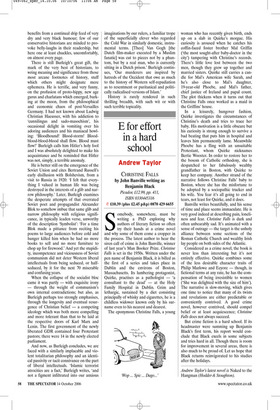E for effort in a hard school
Andrew Taylor
CHRISTINE FALLS by John Banville writing as Benjamin Black Picador, £12.99, pp. 411, ISBN 0330445316 ✆ £10.39 (plus £2.45 p&p) 0870 429 6655 Somebody, somewhere, must be writing a PhD exploring why authors of literary fiction so often try their hands at a crime novel and why some of them come a cropper in the process. The latest author to hear the siren call of crime is John Banville, winner of last year’s Man Booker Prize. Christine Falls is set in the 1950s. Written under the pen name of Benjamin Black, it is billed as the first of a series and takes place in Dublin and the environs of Boston, Massachusetts. Its lumbering protagonist, Quirke, practises as a pathologist — ‘a consultant to the dead’ — at the Holy Family Hospital in Dublin. Grim and lethargic, sustained by a diet consisting principally of whisky and cigarettes, he is a childless widower known only by his surname even to his nearest and dearest.
The eponymous Christine Falls, a young woman who has recently given birth, ends up on a slab in Quirke’s morgue. His curiosity is aroused when he catches his coffin-faced foster brother Mal Griffin (‘the most sought-after baby-doctor in the city’) tampering with Christine’s records. There’s little love lost between the two men, though they grew up together and married sisters. Quirke still carries a candle for Mal’s American wife Sarah, and he’s also close to Mal’s daughter, 19-year-old Phoebe, and Mal’s father, chief justice of Ireland and papal count. The plot thickens when it turns out that Christine Falls once worked as a maid in the Griffins’ house.
In a leisurely, hungover fashion, Quirke investigates the circumstances of Christine’s death and tries to trace her baby. His motivation is a little obscure but his curiosity is strong enough to survive a bad beating that puts him in hospital and leaves him permanently lame. Meanwhile Phoebe has a fling with an unsuitable Protestant, whom Quirke nicknames Bertie Wooster. In order to restore her to the bosom of Catholic orthodoxy, she is despatched to her fabulously wealthy grandfather in Boston, with Quirke to keep her company. Another strand of the narrative follows Christine Falls’ baby to Boston, where she has the misfortune to be adopted by a sociopathic trucker and his wife. You fear it’s all going to end in tears, not least for Quirke, and it does.
Banville writes beautifully, and his sense of time and place seems immaculate. He is very good indeed at describing pain, loneliness and fear. Christine Falls is dark and often unbearably sad. It’s animated with a sense of outrage — the target is the unholy alliance between some sections of the Roman Catholic Church and wealthy Irish lay people on both sides of the Atlantic.
Considered as a crime novel, the book is never less than interesting but it’s not entirely effective. Quirke combines some of the less desirable character traits of Philip Marlowe and Eeyore — though, in fictional terms at any rate, he has the compensation of being irresistible to women (‘She was delighted with the size of him’). The narrative is slow-moving, which gives one time to notice that many of its twists and revelations are either predictable or conveniently contrived. A good crime novel, however contrived, should compel belief or at least acquiescence; Christine Falls does not always succeed.
But crime fiction is a hard school. If its headmaster were summing up Benjamin Black’s first term, his report would conclude that Black excels in some subjects and tries hard in all. Though there is room for improvement in several areas, there is also much to be proud of. Let us hope that Black returns reinvigorated to his studies after the holidays.


































































































 Previous page
Previous page